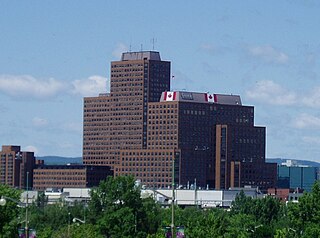In the United States government, independent agencies are agencies that exist outside the federal executive departments and the Executive Office of the President. In a narrower sense, the term refers only to those independent agencies that, while considered part of the executive branch, have regulatory or rulemaking authority and are insulated from presidential control, usually because the president's power to dismiss the agency head or a member is limited.

The Communications Security Establishment, formerly called the Communications Security Establishment Canada (CSEC), is the Government of Canada's national cryptologic agency. It is responsible for foreign signals intelligence (SIGINT) and communications security (COMSEC), protecting federal government electronic information and communication networks, and is the technical authority for cyber security and information assurance.
Global Affairs Canada is the department of the Government of Canada that manages Canada's diplomatic and consular relations, promotes Canadian international trade, and leads Canada's international development and humanitarian assistance. It is also responsible for maintaining Canadian government offices abroad with diplomatic and consular status on behalf of all government departments.

The Canadian Security Intelligence Service is a foreign intelligence service and security agency of the federal government of Canada. It is responsible for gathering, processing, and analyzing national security information from around the world and conducting covert action within Canada and abroad. CSIS reports to the Minister of Public Safety, and is subject to review by the National Security and Intelligence Review Agency.
The following list outlines the structure of the federal government of Canada, the collective set of federal institutions which can be grouped into the legislative, executive, and judicial branches. In turn, these are further divided into departments, agencies, and other organizations which support the day-to-day function of the Canadian state.
Innovation, Science and Economic Development Canada is a department of the Government of Canada. ISED is responsible for a number of the federal government's functions in regulating industry and commerce, promoting science and innovation, and supporting economic development. The department was known as Industry Canada (IC) prior to 2015.

The Correctional Service of Canada, also known as Correctional Service Canada or Corrections Canada, is the Canadian federal government agency responsible for the incarceration and rehabilitation of convicted criminal offenders sentenced to two years or more. The agency has its headquarters in Ottawa, Ontario.

Public bodies of the Scottish Government are organisations that are funded by the Scottish Government. They form a tightly meshed network of executive and advisory non-departmental public bodies ("quangoes"); tribunals; and nationalised industries. Such public bodies are distinct from executive agencies of the Scottish Government, as unlike them they are not considered to be part of the Government and staff of public bodies are not civil servants, although executive agencies are listed in the Scottish Government's directory of national public bodies alongside other public bodies.
The Australian Intelligence Community (AIC) and the National Intelligence Community (NIC) or National Security Community of the Australian Government are the collectives of statutory intelligence agencies, policy departments, and other government agencies concerned with protecting and advancing the national security and national interests of the Commonwealth of Australia. The intelligence and security agencies of the Australian Government have evolved since the Second World War and the Cold War and saw transformation and expansion during the Global War on Terrorism with military deployments in Afghanistan, Iraq and against ISIS in Syria. Key international and national security issues for the Australian Intelligence Community include terrorism and violent extremism, cybersecurity, transnational crime, the rise of China, and Pacific regional security.

The Federal Accountability Act is a statute introduced as Bill C-2 in the first session of the 39th Canadian Parliament on April 11, 2006, by the President of the Treasury Board, John Baird. The aim was to reduce the opportunity to exert influence with money by banning corporate, union, and large personal political donations; five-year lobbying ban on former ministers, their aides, and senior public servants; providing protection for whistleblowers; and enhancing the power of the Auditor General to follow the money spent by the government.

The Competition Bureau is the independent law enforcement agency in charge of regulating competition in Canada, responsible for ensuring that markets operate in a competitive manner.

The Canadian Transportation Agency is the independent, quasi-judicial tribunal of the Government of Canada that makes decisions relating to federally-regulated modes of transportation. Its headquarters are in the Jules Léger Building (South) in Terrasses de la Chaudière, Gatineau, Quebec.

Human rights in Canada have come under increasing public attention and legal protection since World War II inspired by Canada's involvement in the creation of the Universal Declaration of Human Rights in 1948. The current legal framework for the protection of human rights in Canada consists of constitutional entitlements, and statutory human rights codes, both federal and provincial.
Ombudsmen in Australia are independent agencies who assist when a dispute arises between individuals and industry bodies or government agencies. Government ombudsman services are free to the public, like many other ombudsman and dispute resolution services, and are a means of resolving disputes outside of the court systems. Australia has an ombudsman assigned for each state; as well as an ombudsman for the Commonwealth of Australia. As laws differ between states just one process, or policy, cannot be used across the Commonwealth. All government bodies are within the jurisdiction of the ombudsman.
Following the 2010 United Kingdom general election, the UK Government under the Cameron–Clegg coalition announced plans to curb public spending through the abolition of a large number of quasi-autonomous non-governmental organisations (quangos). This was styled in the national press as a "bonfire of the quangos", making reference to Girolamo Savonarola's religiously inspired Bonfire of the Vanities.

The Government agencies in Bangladesh are state controlled organizations that act independently to carry out the policies of the Government of Bangladesh. The Government Ministries are relatively small and merely policy-making organizations, allowed to control agencies by policy decisions. Some of the work of the government is carried out through state enterprises or limited companies.








